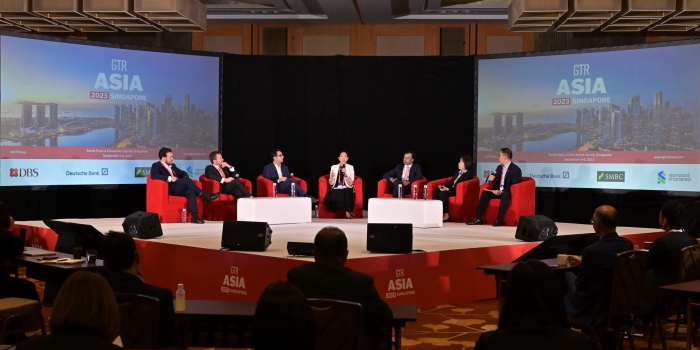RER: Where Conservation and Chilli Farming Meet
There was a time when Riau farmer Zamri had to struggle to make ends meet, having to provide for his wife and children, as well as for his mother and...

Latest updates on what's happening in RGE Group

GTR (Global Trade Review) Asia 2023, a leading banking event that offers insights into the world of trade, treasury, commodities and Fintech, took place in Singapore on 5-6 September 2023. This year, it attracted 1,232 delegates over the two-day conference.
Lucita Jasmin, Director of Sustainability & External Affairs of APRIL Group, on behalf of RGE, took part in a panel discussion “ESG, sustainability and trade – an evolving conversation” that was moderated by David W Y Koh at SMBC Group. Along with Pradeep Nair at Standard Chartered Bank, Mitesh Karia at Crédit Agricole CIB, Adam Hearne at CarbonChain, Will Day-Robinson at Tysers and Shadow Zhao Ying at IXM, Lucita shared the evolution and progress of our sustainability journey.
Sustainability: From Compliance to a Key Driver of Growth
Lucita began by discussing the evolution of RGE’s approach to sustainability. In the early 2000s to the late 2000s RGE’s focus was primarily on addressing operational and regulatory concerns, with a reactive approach to sustainability where issues were being addressed as they were raised.
In 2015, RGE adopted an ESG framework, leading to a shift towards compliance with their own sustainability policies and voluntary commitments. For instance, APRIL Group established a sustainable forest management policy. This policy formalised APRIL’s pledge to achieve zero deforestation and to preserve natural forest areas at a 1-to-1 ratio, meaning that for every hectare of planted forest, an equal area of natural forest would be safeguarded. This milestone was accompanied by a growing desire among stakeholders, especially banks, to better understand the group’s business context.
In 2020, RGE launched its 2030 sustainability agenda, emphasising a holistic approach covering climate, nature, people, and sustainable growth and embedded sustainability in its business strategy to be a strategic driver of growth.
Working with Partners on Outcome and Impact
Lucita went on to explain how RGE made a significant strategic shift by predominantly relying on Sustainability-Linked Loans in 2022 for its financing needs, successfully securing US$1.6 billion in such loans in 2021, and another US$1.6 billion in 2022.
This change reflected an evolution in RGE’s stakeholder engagement, particularly in its interactions with banking partners. The discussions have evolved from primarily addressing risk mitigation, reputational concerns and compliance with national regulations to addressing global sustainability challenges and actively striving to achieve positive impacts. The focus now is on building partnerships with stakeholders, including banks, as an integral part of the broader transformation process towards sustainable practices and growth.
Action with Measurable Impacts
The conversation then shifted to the topic of addressing potential pushbacks that companies face in their ESG initiatives and Lucita highlighted the point on transparency.
“It’s really about, how do you verify that you’re doing what you’re supposed to be doing?” she said.
To address this, various mechanisms have been implemented within RGE, aligning with industry best practices. The progress of its science-based, measurable sustainability targets are monitored, reported and verified by independent parties for transparency.
Many banks have come to rely on these audits and sustainability disclosures to maintain trust in ESG as a corporate responsibility.
Another key point she brought up was that the social aspect of ESG often gets less attention in conversations with banking partners. Despite this, RGE has taken a holistic approach by adopting a 2030 sustainability agenda, emphasising inclusivity. For example, APRIL has set a target to eliminate extreme poverty within a 50-kilometre radius of its concession boundaries.
“That’s quite a stretch in terms of our responsibility, but that is how you operate in the landscape.” Lucita explained. Top of Form
She concluded: “Ultimately, action on the ground, with measurable impacts, is what defines and drives RGE.”